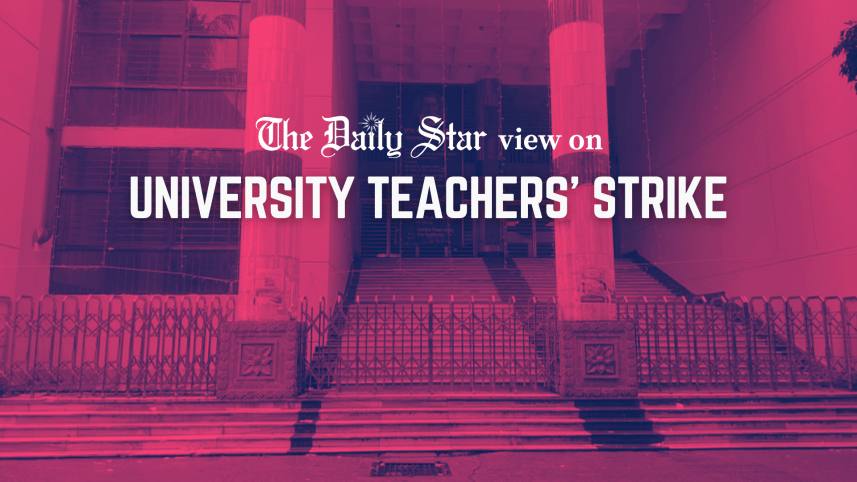Pension worries must be resolved

In a concerning development, Bangladesh's public universities have come to a grinding halt. Classrooms are locked, exams are postponed, and administrative work has stalled, as staff of 35 public universities have gone on an indefinite strike demanding the withdrawal of the Prottoy Universal Pension Scheme. Teachers argue that the new scheme—which will be applicable for recruits joining on or after July 1 in any autonomous, self-governing, nationalised, statutory, or such organisations and their subordinate institutions—is discriminatory, offering significantly lower benefits compared to the existing system for government employees.The government, on the other hand, defends Prottoy as a step towards a uniform and sustainable pension system for all public sector employees. They claim the scheme, in the long run, will offer higher monthly payouts than the existing plan.
While currently no money is deducted from teachers' salary, under Prottoy, 10 percent of the monthly basic salary of an employee, up to Tk 5,000, will be deducted for the pension fund, and the organisation will contribute a matching amount to the fund. Meanwhile, there will be no one-time gratuity for the retiring employee, but instead a significantly higher monthly installment will be payable to the retired individual for their lifetime. In case of death, however, dependents can claim the pension for 15 years from when the installment starts, rather than for a lifetime as per the current scheme. And there will no longer be a five percent annual increment on the pension amount.
While there can be no denying the budgetary burden of pension payments, and the need for a modernised, universal and sustainable pension system, the question raised by the academics remains—if the system is so good, why have bureaucrats, judiciary and military personnel been exempted from it? While the government says they will institute a similar scheme for bureaucrats, there are anxieties among teachers—not without reason—about possible discrimination in benefits in the absence of any clarity on the matter. Why institute such a top-down approach to implementation without, at the very least, engaging academics and other Prottoy pensioners in a meaningful dialogue?
The Bangladesh University Teachers Samity Federation has been organising various programmes since the new scheme's announcement on March 13, including half-day work abstention on June 4, and work abstention for three consecutive days last week. We are at a loss to understand why, during this time, no attempt was made to engage the aggrieved parties in a consultation. Whatever the merits or demerits of Prottoy may be, it is obvious that a consensus cannot be reached without constructive and transparent discussions among the relevant stakeholders as well as an impartial assessment of the benefits of such a scheme.
Having said that, we cannot condone an indefinite strike on education. For the sake of the students, we need to find a solution fast, which requires open dialogue and compromise, not egoistic tussles. The government needs to address the concerns of discrimination and provide a transparent review of the scheme's calculations. Moving forward, we also need to initiate a broader discussion about how "universal" the scheme really is, including for those outside the purview of public institutions.



 For all latest news, follow The Daily Star's Google News channel.
For all latest news, follow The Daily Star's Google News channel. 

Comments